
Competency 1
Foster a sense of belonging and community, reduce feelings of isolation, and promote a collaborative work-academic environment.

Welcome to Rutgers–New Brunswick
Whether you're a first-year student or well on the way to your degree, Rutgers is a big place with limitless possibilities. Click below to find handy tips to start your semester off right.
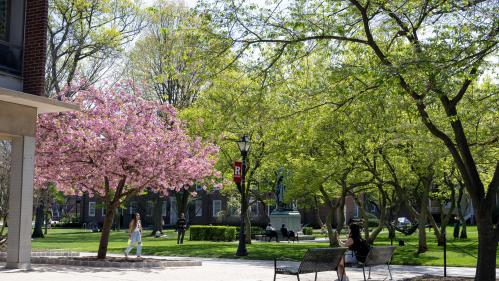
About ScarletWell
About ScarletWell

ScarletWell is a novel public health and prevention-focused program promoting the holistic well-being of Rutgers–New Brunswick's 79,000+ students, faculty, and staff as part of the university's Academic Master Plan. The program's inaugural 2024-25 year brought a diverse array of wellness-related programming, peer support services, wellness project grant funding, and more to Rutgers–New Brunswick.
In 2023, a specialized ScarletWell Task Force was charged with taking stock of Rutgers–New Brunswick’s collective wellness initiatives, benchmarking them to peer institutions across the country, recognizing strengths and gaps, and creating recommendations for stronger coordination and enhancements of wellness-related offerings across the university's four campuses.
The Task Force's work led to the creation of ScarletWell, including the appointment of a Chief Wellness Officer (CWO) and Director of ScarletWell, tasked with making Rutgers–New Brunswick a national model for other academic institutions seeking to prioritize health & wellness among their students, faculty, and staff. In 2024, ScarletWell was staffed with a senior program coordinator.
ScarletWell works directly with the Provost and Chancellor to coordinate wellness resources across campus, bring innovative evidence-based wellness practices and ensure that holistic health and wellness is prioritized as Rutgers–New Brunswick charts the future and implements its pioneering Academic Master Plan.
Moving forward, ScarletWell aims to be a pioneering exemplar of university-wide wellness programming that is inclusive, holistic, and multidisciplinary.
ScarletWell Team

Joshua Langberg, PhD (he/him) is Rutgers–New Brunswick's inaugural Chief Wellness Officer (CWO), a clinical psychologist & professor of psychology at the Rutgers Graduate School of Applied and Professional Psychology (GSAPP), and Director of the Center for Youth Social Emotional Wellness (CYSEW).

Peggy Swarbrick, PhD (she/her) is Director of ScarletWell, a research professor in the Applied Department of the Rutgers Graduate School of Applied and Professional Psychology (GSAPP), and Associate Director of the Center of Alcohol and Substance Use Studies.
Research Publications
Bulgin, T., Eng, B., Abid, M., Malhotra, R., Weinsztok, S., & Swarbrick, M. (2026). Creating a graduate student wellness space through a Co production design. Journal of American College Health, 1–6. https://doi.org/10.1080/07448481.2026.2616510
This paper outlines a collaborative initiative, showcasing how direct student involvement can enhance the relevance and effectiveness of wellness resources on college campuses.
Ramachandran, S., Nguyen, J., Spagnolo, A., Swarbrick, M., Janelli, R., & Haghani, S. (2025). 4th International Conference on Computing, Management and Telecommunications (ComManTel), Madrid, Spain, 2025, pp. 179-182, doi: 10.1109/ComManTel68363.2025.11368432.
https://ieeexplore.ieee.org/document/11368432
This paper presents the design and deployment of the ScarletWell Wellness Widget, an interactive digital interface integrated within the Rutgers University portal to promote holistic wellness among students, faculty, and staff. Built around the Eight Dimensions of Wellness, the widget streamlines access to wellness resources and events through an intuitive, centralized platform.
Swarbrick, M. Ph.D., Sanders-Edwards, L. & Cronise, R. A wellness model developed by and for individuals with lived experience. (2025). Psychiatric Services.
https://psychiatryonline.org/doi/10.1176/appi.ps.20240257
This column explores the use of a wellness model developed by and for individuals with lived experience of mental health or substance use conditions. An overview of the model, including its development and rationale, is provided along with examples of the effective use of tools based on the wellness model. The use of this approach among members of a community wellness center is described. Firsthand experiences of the authors are used to illustrate their personal journeys in using the model for their own recovery and in peer support work.
Swarbrick, Margaret, Ayyala, M. S., Chen, P.-H., & Brazeau, C. M. L. R. (2024). Cultivating Connections: An Interprofessional Peer Support Model. Psychiatric Services, 0(0). https://doi.org/10.1176/appi.ps.20240104
Peer support models have existed for decades in behavioral health care and are being developed for health care professionals to help address high rates of burnout and stress in the health care environment. Such models typically involve individuals from the same profession. With the concurrent increase of interprofessional integrated behavioral health care models, interprofessional peer support seems a viable model. This Open Forum describes how a peer support program for physicians and faculty scientists evolved to include a broader range of health care professionals, providing a framework for interprofessional peer support programs for the behavioral health care workforce.
Richardson, Devon, Aranda, Frances, Cook, Judith A., & Swarbrick, Margaret. (2024). "How Individuals with Mental Health Challenges Coped During the COVID-19 Pandemic." Clinical Nursing Research, 10547738241273294. Advance online publication.
https://journals.sagepub.com/doi/10.1177/10547738241273294
Using results from a cross-sectional, online survey administered during April and May 2020, qualitative methods were used to examine how individuals with symptoms of depression and anxiety were coping with COVID-19. Data came from 48 participants who reported current symptoms of anxiety assessed by the Generalized Anxiety Disorder-2 Scale and/or depression assessed by the Patient Health Questionnaire-2. Respondents demonstrated resilience in navigating disruptions brought on by COVID-19 and reported a range of healthy coping strategies. Three themes were identified in characterizing successful coping strategies, including utilizing social support systems, practicing self-care, and adjusting one’s mindset to deal with challenging experiences. When designing programs, policies, and clinical approaches to support people with mental health conditions, it is essential to focus on strengths. The coping strategies shared by the individuals in this study demonstrate and build on their resilience.
Brazeau, Chantal, Ayyala, M.S., Chen, P.H., Swarbrick, M. (2024). “Having Support at Work ‘Is Different’ and Important”: A Qualitative Study of Virtual Peer Discussion Groups With Medical School Faculty. Academic Medicine. DOI: 10.1097/ACM.0000000000005916
CIRCLE was inaugurated in October 2020 at Rutgers New Jersey Medical School and Rutgers Robert Wood Johnson Medical School using evidence-informed topics. The inaugural CIRCLE peer-led discussion groups included 50 physicians who met twice monthly in groups of 5 to 8 between October 2020 and April 2021. Deidentified transcript data were iteratively reviewed using conventional content analysis, including familiarization, thematic framework creation, indexing, charting, mapping, and interpretation. Themes were grouped into 4 conceptual framework categories based on social support theory in the context of work-related stress: emotional, appraisal, informational, and instrumental support.Themes emerged based on the framework: emotional support (connecting on a deeper level, importance of support at work, COVID-19 made virtual connections needed), relevant appraisal support (feeling “not alone,” safe space to connect and share), informational support (sharing self-care strategies), and instrumental support (incentives to join are helpful but connection leads to engagement, some structure but “not too much” is important, virtual modalities are convenient and conducive to connection).
Swarbrick, M., Spagnolo, A., Castelano, C., Vogel, M., Valovcin, D.D., & Lunquist, M.C. (2021). Reciprocal Peer Support Wellness (RPS-W): A Model of Virtual Peer Support. American Journal of Psychiatric Rehabilitation 24(1), 20-38.
https://dx.doi.org/10.1353/jpr.2021.a934160
This brief report details how a Reciprocal Peer Support Wellness (RPS-W) virtual training program prepared Peer Support Specialists (PSS) to practice strategies personally and engage callers from high-risk groups to address their needs and challenges by focusing on overall wellness. This pilot virtual training program focused on RPS techniques and wellness self-care strategies delivered during regularly scheduled 30-minute shift briefs two times per week for four weeks to equip PSS to address the increasing demands for supports compounded by the COVID-19 pandemic and its negative consequences on overall wellness. Twenty PSS and two supervisors completed the training. Data indicated (1) call volume increased, (2) PSS post-session feedback aligned with the objectives of the wellness self-care and RPS-W techniques, and (3) PSS implemented RPS-W techniques and wellness activities for themselves and callers with continued support by supervisors one year post training. The role of the supervisors in supporting PSS to apply knowledge and skills, and to embed continuous wellness activities into existing workflows, was essential. This article describes some unique aspects of the training, impacts, and feedback gathered one year post training.
2025-2026 ScarletWell Funded Connection Grants Announced
ScarletWell congratulates the second round of Wellness Connection grant recipients. Grant awards range from $500–$1,000 to support student-led (Wellness Connection Grants) and faculty-staff directed (Wellness at Work Grants) wellness activities in Fall of 2025 and Spring of 2026 (September-May).
Wellness at Work Grants, led by faculty and staff, will be offered in partnership with the Center for Faculty Success, to support workplace-centered wellness activities that include faculty and staff participating together to promote a culture of wellness across New Brunswick schools, departments, divisions, and/or work teams.
Wellness Connection Grants, led by students and sponsored by faculty, empower students to create events and spaces at Rutgers–New Brunswick that foster communities of connection across New Brunswick student groups.
We congratulate this year's recipients and look forward to sharing more as their wellness activities are offered. Check the Wellness Calendar to participate.
2025-2026 Connection Grants
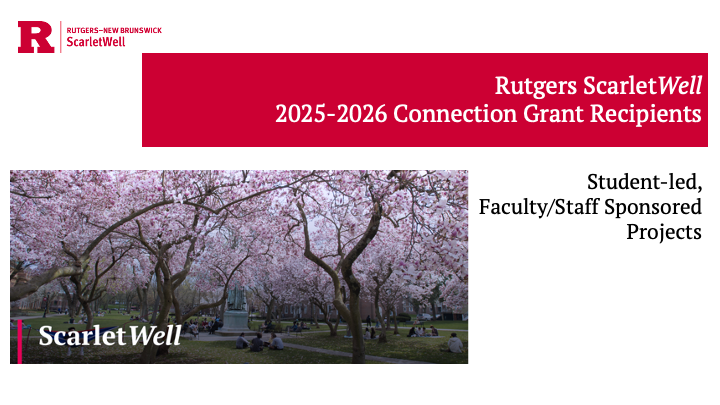

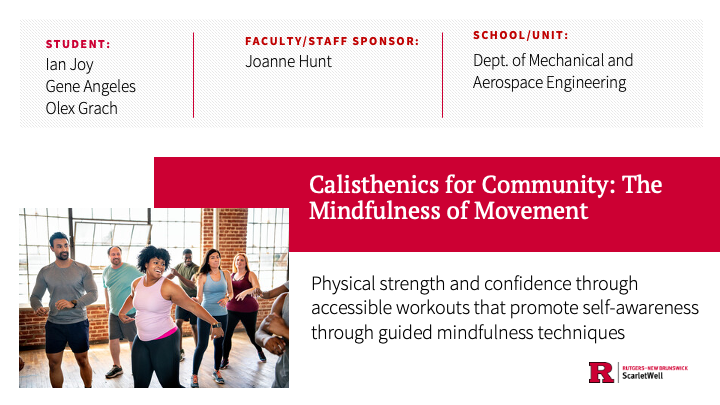
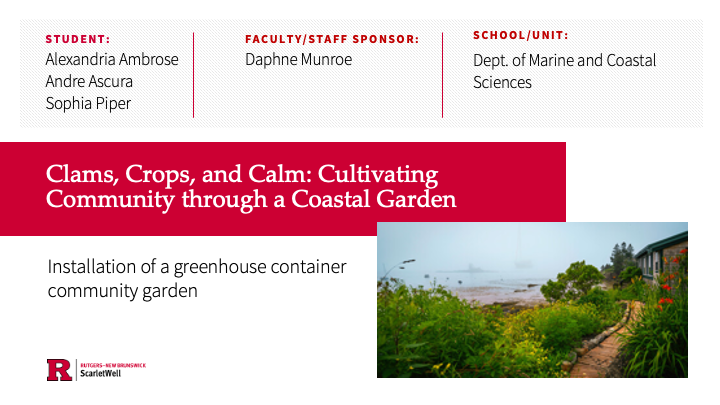









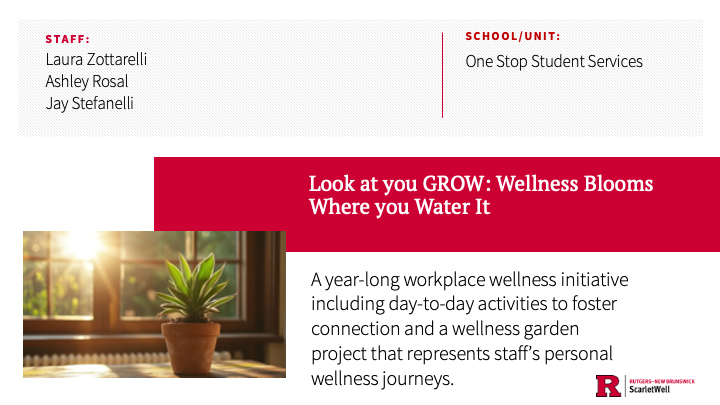


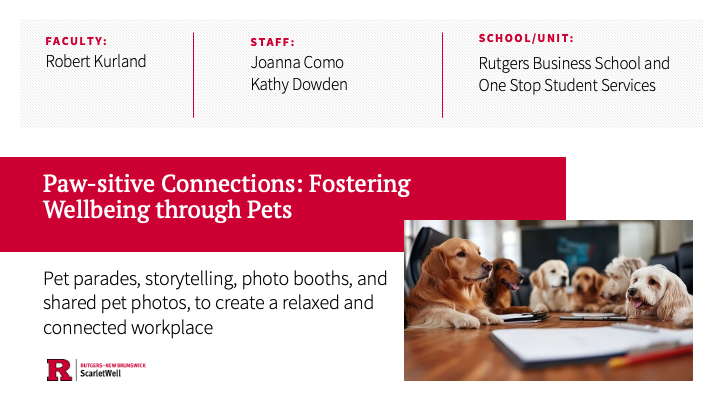


Wellness at Work Grants
Advancing Renewal: Wellness and Healing through the Arts
Embodied Wellness and Connection Through Polestar Pilates Mat
Limitless Wellness at Rutgers: Where Community Meets Connection!
Look at you GROW: Wellness Blooms where you Water It
Meet your Stretch Goals: Creating Physical and Mental Flexibility
Nourish to Flourish
Paw-sitive Connections: Fostering Wellbeing Through Pets
Rooted in Wellness: Growing Health and Community Through Agriculture-Based Experiences
Wellness Sensory Garden: Cultivating Community, Health and Harmony
Connection Grants
Beloved, A Night for Women
Calisthenics for Community: The Mindfulness of Movement
Clams, Crops, and Calm: Cultivating Community through a Coastal Garden
Introducing Resinate! Resin Jewelry-Making as Storytelling, Self-Expression, and Everyday Empowerment!
Move with Meaning: A Wellness Experience Focused on Mindful Movement, Presence, and Emotional Clarity.
Planting a Healthy Mindset
Trail Doodles: Incorporating Art and the Outdoors for Wellness
Wellness through Clay
2024-2025 Wellness at Work Connection Grants
The 2024-2025 ScarletWell and Center for Faculty Success Wellness at Work Connection Grants facilitated by faculty and staff recipients have concluded. These projects supported workplace-centered wellness activities that included faculty and staff participating together to promote a culture of wellness across New Brunswick schools, departments, divisions, and/or work teams.
The 2024-2025 recipients are presented below.
2024-2025 Student Wellness Connection Grants
Interpersonal connection is a critical component of wellness. ScarletWell is committed to empowering students to create events and spaces at Rutgers–New Brunswick that foster lasting communities of connection. The first round of Wellness Connection Grants, ranging from $200–$1,500 to support student-directed wellness activities were offered in the Winter/Spring 2025.
Learn more about the 2024-2025 grant recipients below.
Inaugural and Grant-Supported Initiatives
In 2023, the ScarletWell Task Force submitted and received a 1.6 million dollar grant from the Office of the Secretary of Higher Education (OSHE) to significantly increase mental health and wellness services here at Rutgers. The grant was led by Dr. Noa’a Shimoni, Associate Vice President for Student Health and Wellness and Associate Vice Chancellor for Student Affairs, Student Health and Wellness at Rutgers-New Brunswick, in collaboration with Dr. Francesca Maresca, Assistant Vice Chancellor for Health and Wellness, Dr. Jennifer Jones-Damis, Director of CAPS, and the ScarletWell leadership team. The figure below displays the new services available to Rutgers students and provides links to access them.
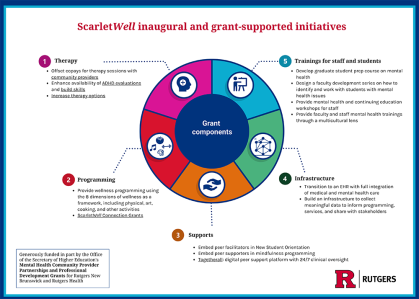
Peer Support Leader Program
The Peer Support Leader program includes in-person training and virtual practice sessions leading to a Digital Badge. The program is designed to develop a network of staff and faculty leaders at Rutgers who can foster wellness and a sense of belonging and community.
Meet the 2024-2025 Peer Support Leaders
Rutgers Business School
Dining Services
Educational Opportunity Fund
Graduate School of Education
Learning Centers
Mason Gross School of the Arts
Math & Physical Sciences
Nursing
One Stop Student Services
Recreation
School of Arts and Sciences
School of Engineering
School of Management and Labor Relations
Student Affairs
Undergraduate Admissions
The most rewarding part has been walking away from some encounters feeling like I have made an impact—lightened someone’s emotional/mental load or put an extra spring in their step—knowing they are not alone.
Peer Support Leader
Competencies

Competency 1
Foster a sense of belonging and community, reduce feelings of isolation, and promote a collaborative work-academic environment.

Competency 2
Help fellow peers to cope with the emotional demands by providing a safe space to share feelings, reduce stress, and prevent burnout.

Competency 3
Provide empathy, kindness, caring, and understanding to foster a supportive community
Congratulations to the Peer Support Leaders

On June 3, 2025, at the Rutgers Garden Pavilion, 35 Rutgers-NB staff and 5 Rutgers Health faculty received recognition for earning the Peer Support Leader micro-credential, demonstrating their commitment and competence in supporting their colleagues and serving as Wellness Champions. Their commitment to training and participating in monthly peer support sessions to practice and refine skills over the past nine months is commendable! Supporting staff in the workplace is important to promote professional fulfillment, work life balance, and to prevent burnout. These Peer Support Leaders’ passion for connection and wellness will strengthen our Rutgers University–New Brunswick community. Congratulations to all!
Peer support involves mutual assistance and sharing of knowledge, experiences, and emotional support among individuals with similar roles or life experiences. Peer support relies on reciprocity, empathy, and shared understanding, fostering a sense of community and reducing feelings of isolation.
Benefits of Peer Support:
Peer Support Training Information
ScarletWell staff is available to help faculty, students, or staff working in similar positions to come together and form Peer Support Groups and become trained Peer Supporters through training and technical support to create Peer Support groups that promote connection and enhance overall wellness.
People who complete the training and mentoring sessions become eligible for a Peer Support Leader Digital Badge. Requirements for the Digital Badge include:
Peer Support Training: 3-hour, in-person training to learn effective peer support skills, including active listening, empathy, wellness self-care, and confidentiality.
Meetings and Activities: 9 mentoring sessions to build and refine skills. These meetings offer opportunities to share experiences, provide one another support, and gain access to self-care, mental health, and wellness resources. ScarletWell staff initially facilitates the sessions and mentors trained peer supporters to facilitate support groups themselves as often as they wish.
Competency Assessment: Survey to evaluate the comfort with and use of peer support leader competencies.
To learn more about starting a Peer Support group contact Peggy Swarbrick at swarbrma@rutgers.edu.
Wellness Resources
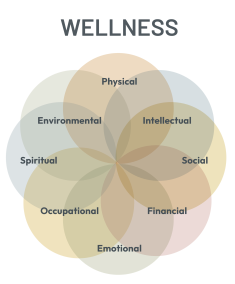
ScarletWell has compiled lists of helpful Rutgers and other resources to support your wellness in each of the eight dimensions: physical, intellectual, emotional, financial, social, spiritual, occupational, and environmental.
Start Your Journey
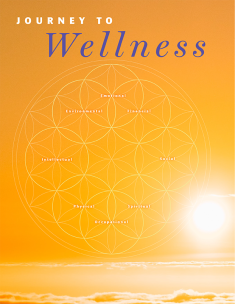
The Journey to Wellness Guide will help you find new ideas to begin or continue your wellness journey.
Access the Guide Download the Guide
Download SAMSHA's step-by-step guide to wellness.
Mental Health Services
Counseling, Alcohol and Other Drug Assistance Program & Psychiatric Services (CAPS) supports students through individual and group counseling, crisis intervention, medication management, and community referrals.
Center for Psychological Services offers the Rutgers community confidential mental health services in a state-of-the-art outpatient training center with 11 clinics as part of the Graduate School of Applied and Professional Psychology.
Find Health & Wellness Resources for Post-Doctoral Research Fellows
Medical Services
Rutgers Student Health takes a comprehensive approach to health and wellness, offering medical services that include preventative, routine, and immediate medical care as well as writing/filling prescriptions. If you are experiencing a medical emergency, dial 911 or call Rutgers University Police Department (RUPD) at 848-932-7211. Rutgers Student Health is not an emergency medical center.
New Holistic Wellness Minor
The Holistic Wellness minor is a unique, interdisciplinary 18-credit program that prepares students to promote wellness in any career path.
Available Trainings & Workshops
Request Training or Consultation
Description: This session provides an overview of wellness and its connection to mental health. Participants will learn about the eight dimensions of wellness and how they interrelate to influence mental health. The session will highlight the importance of maintaining balance in these areas and provide practical strategies for integrating wellness practices into daily life. Attendees will also explore common mental health challenges and the impact of stress on mental health. This workshop aims to raise awareness, reduce stigma, and encourage proactive approaches to mental health.
Key Takeaways:
Description: This interactive workshop focuses on the development of personalized self-care plans to promote good mental health. Participants will engage in activities to identify their self-care needs and explore various self-care techniques. The session will cover self-care, emphasizing the importance of regular self-assessment and adaptation of self-care strategies. Attendees will leave with a concrete wellness self-care plan tailored to their individual needs and circumstances.
Key Takeaways:
Description: Effective communication is crucial for fostering a supportive learning environment. This workshop equips educators and academic staff with the skills to communicate supportively with learners, enhancing their academic and personal success. Participants will learn techniques for active listening and providing constructive feedback. The session will also address strategies for recognizing and responding to students' mental health needs and building strong, supportive relationships.
Key Takeaways:
Description: This session aims to equip participants with the skills and knowledge to become effective mental health and wellness champions. Attendees will learn how to identify potential champions, develop leadership qualities, and create sustainable initiatives that promote mental health and wellness. The session will cover strategies for organizing and maintaining a network of champions who can advocate for and implement wellness programs.
Key Takeaways:
Description: Creating and sustaining a positive working culture is essential for the well-being of employees and the overall success of an organization. This workshop provides practical wellness tips and strategies to foster a supportive and healthy work environment. Participants will learn about the importance of workplace wellness, techniques for reducing stress, and ways to promote work-life balance. The session will also cover how to encourage open communication, recognize and celebrate achievements, and create a culture of mutual respect and support.
Key Takeaways:
Description: This workshop introduces college students to the fundamentals of peer support, highlighting the importance of building supportive relationships among peers to enhance mental health and well-being. Participants will learn about the key principles of peer support, including empathy, active listening, and mutual respect. The session will cover practical skills for providing effective support to peers, recognizing signs of distress, and referring peers to resources. Students will also explore ways to maintain their own wellness while supporting others.
Key Takeaways:
Description: This workshop equips college faculty and staff with the essential skills to provide peer support within their professional community. Participants will learn about the role of peer support in promoting a healthy and collaborative work environment. The session will cover key concepts such as creating a culture of trust, offering emotional support, and facilitating open communication. Faculty and staff will also learn practical strategies for identifying colleagues in need of support and guiding them to appropriate resources, while ensuring their own well-being.
Key Takeaways:
Description: Our days are hectic. Attention to self-care and simple daily practices can build resilience and increase a person’s overall wellness. This session will introduce the practice of taking time for yourself and, specifically, taking a few moments to “pause.” The overall purpose of the session is to focus on the present moment taking time to pause to learn how to become aware of thoughts and breath.
Key Takeaways:
Description: This session addresses taking time for yourself, specifically breathing, moving, and nourishing your body and mind. The overall purpose of the session is to focus on the present moment and become aware of thoughts and your breath, to move mindfully, and to think about how to nourish the mind and body to improve mood, decrease anxiety, and lessen the feelings of stress.
Key Takeaways:
Description: The session focuses on the importance of sleep and rest and how to use the strategies presented throughout the self-care series to help you fall asleep and stay asleep. Participants will explore using what they have learned about pausing, breathing, moving, and nourishing the body and mind to relax into a restful sleep.
Key Takeaways:
Description: In this session, you will explore ways to create wellness plans that sustain the benefits of the wellness self-care practices of the series. You will be re-oriented to the pause, breathe, move, and nourish practices to re-experience the benefits as you work toward establishing self-care daily plans.
Key Takeaways:
Description: Every unit throughout the university has its own culture, based on its values, traditions, communication patterns, and policies. This interactive session will introduce concepts, tools, and leadership strategies to evaluate and improve your wellness culture.
Key Takeaways:
Description: This consultation session is designed to help faculty and student leaders develop and implement strategies to create a culture that supports mental health and wellness. Participants will receive guidance on identifying the needs of their communities, designing effective wellness strategies, and promoting mental health awareness. The session will include best practices for engaging stakeholders, fostering a supportive environment, and integrating wellness into the fabric of the institution. Leaders will also learn how to evaluate the effectiveness of their initiatives and make necessary adjustments to ensure sustainability.
Key Takeaways:
Opportunities to Connect
ScarletWell offers a comprehensive menu of wellness trainings and workshops for faculty, staff, students, and the community. Trainings are free for Rutgers–New Brunswick faculty, students, and staff and available for a fee to the broader New Jersey community. To request a training or workshop, please email Peggy Swarbrick.
